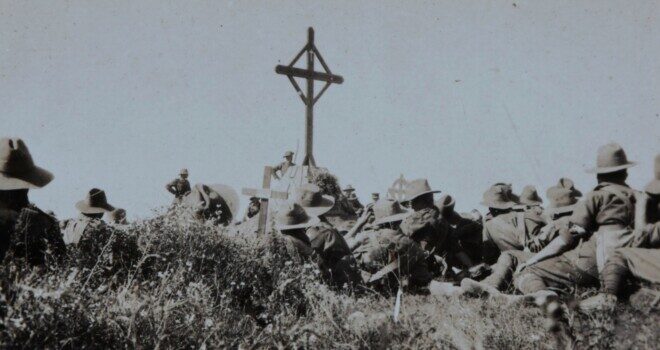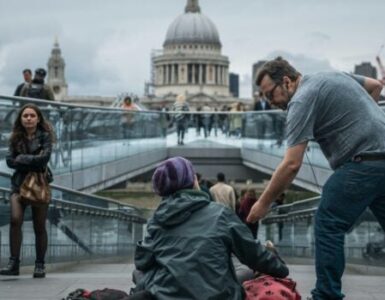Today marks the 8-year anniversary of the tragic murder of Father Jacques Hamel, a French Catholic priest killed by two Islamic terrorists while celebrating Mass in a church in the small town of Saint-Étienne-du-Rouvray, a suburb of Rouen in France. According to eyewitness accounts, Hamel’s last words before getting his throat slashed were “Va-t’en, Satan,” meaning in English “Get away, Satan.”
Hamel is widely regarded as Europe’s first 21st century martyr. His story is compelling for countless reasons, but perhaps the strongest being that the attack on Hamel is symbolic of the multitudinous, increasing, and brutal assaults suffered by the Catholic Church over the past several decades.
It’s a harsh fact that Catholics of this age face a particularly virulent hatred. Across the globe, Catholic churches are being burned, religious statues are being desecrated, laity are being threatened, and priests are being kidnapped, tortured, and killed. I’m not talking about the events of 2nd century Christians; I’m talking about today.
Hamel was born on November 30, 1930, in the commune of Darnetal in Normandy, France’s northern region. At the time of his death, he was serving as a parish priest in the Archdiocese of Rouen. On the morning of July 26, 2016, Adel Kermiche and Abdel Malik Petitjean, who had pledged allegiance to the Islamic State of Iraq, slaughtered Hamel before being shot dead by police. Both men were 19 years old.
Why are Catholic priests and churches so vulnerable? What is at the root of their loathing? The Catholic writer Joseph Massey, in his July 11, 2024, Twitter/X post, answers these questions:
Western civilization is being ransacked by barbarians, and the churches are always the first thing to go. They want us demoralized and cut off from the true source of our strength: God Almighty.
Massey is correct. Catholic churches are targets precisely because it is in these churches that our sacraments reside.
The end result of church attacks is devastating. Recently, a news outlet published a map of France upon which small red icons were pinned to mark the locations of Catholic churches that had been set on fire, vandalized, or attacked. The map was a sea of ominous scarlet badges. One could no longer see France; it was entirely blotted out.
In her May 4, 2021, article entitled “Why France is losing one religious building every two weeks,” Salène Tadié, the Europe Correspondent for the National Catholic Register, writes that “according to the most recent figures from France’s central criminal intelligence unit, 877 attacks on Catholic places of worship were recorded across the country in 2018 alone.” This figure is nearly unfathomable, and—dreadfully—it rises with every passing year.
Tadié notes that ever since Frankish King Clovis I embraced Catholicism in 496 A.D., France has been known as “the eldest daughter of the Church.” This daughter boasts thousands of Catholic structures throughout the nation. Each building is a precious deposit of Frankish heritage, and each has a tale to tell.
Tadié tells one story of the 16th century Church of SaintPierre in Romilly-la-Puthenaye, Normandy. According to Tadié, a fire took place at this church on April 15, 2021, exactly two years after the blaze that ravaged the Cathédrale Notre-Dame de Paris. The Saint-Pierre fire was deemed accidental. However, as with the Notre-Dame blaze, strong suspicions of vandalism linger.
Certainly, churches are targets of those who seek to destroy the Catholic faith. But it can be argued that the prime target is the Eucharist.
Catholics believe that their true source of strength—God Almighty—exists in the Eucharist. We proclaim that the Eucharist is truly the Body, Blood, Soul, and Divinity of the Risen Christ. In Communion, Christ is entirely and fully present. It is a Mystery and, admittedly, an extraordinarily challenging one. But it is nonetheless true.
There exist innumerable affirmations of this truth in the 2000+ history of the Catholic Church, but one particularly persuasive and compelling example can be found in the 8th century miracle of Lanciano in which the Eucharistic Host, at the moment of consecration, turned into human flesh and blood. That Host survives intact to this day. Such incontrovertible evidence of the Living Christ is, of course, anathema to the dark enemies of Catholicism.
Satan’s minions know this: the Catholic priest alone has the power, through the sanctifying grace of the Holy Spirit in the celebration of Mass, to turn ordinary bread and wine into the Body and Blood of Jesus. It is no surprise, then, that those who abhor Catholicism would seek to obliterate priests.
By all accounts, Father Jacques Hamel had an ardent passion for the Eucharist. This passion is beautifully depicted in the icon of Hamel pictured here. In this artistic rendering, the priest’s neck and hands are bloodied: a reminder of his heinous murder. Hamel is displayed holding three white roses—a reminiscence of the Holy Trinity and a representation of the purity and virginity that mark his priestly vow of celibacy. He also cradles in his arms five red roses, (the flower Hamel reportedly loved), and that red brings to mind the color of martyrs.
At the image’s center, positioned directly under the priest’s saintly golden halo, is the Eucharistic Host—held firmly, reverently, and piously in Hamel’s blessed hands. The Host is imprinted with a cross. The Eucharist, like the halo, is utterly luminous. It is filled with light, and it delivers light. It is the reality of Christ’s promise in John 8:12, “I am the light of the world. Whoever follows me will not walk in darkness, but will have the light of life.”
There is no doubt that, in his many years of priestly ministry, Father Jacques Hamel was well acquainted with the forces of darkness and sin that constantly seek to extinguish Jesus’ light.
Surely, Hamel was well-versed with Saint Paul’s writing in Ephesians 6:12, “For we wrestle not against flesh and blood, but against principalities, against powers, against the rulers of the darkness of this world, against spiritual wickedness in high places.” Hamel’s death underscores the incontrovertible fact that mankind is engaged in a fierce spiritual warfare. Indeed, for every Catholic living in these troubled times, the conflict between light and darkness, good and evil, is abundantly clear—politically, culturally, socially, and psychologically we have cut ourselves off from God. In this catastrophic detachment we have severed ourselves from grace. It is only through a devoted return to the sacraments, most especially the Eucharist, that we will be saved.
In contemplating the war on Catholicism, there is one thing we must remember. If we, as Catholics, truly seek repair, conversion, renewal, and redemption, we must look first to the reparation of our own hearts. The entire world’s sanctification begins there.
The battle that rages, for both our souls and our Church, is indeed fierce. All Catholics are beckoned to serve. Some will, like Hamel, even become martyrs for the Faith. Ultimately, we are each called, in every moment of every day, to utter from the depths of our hearts Hamel’s faithful and courageous words: “Va-t’en, Satan.”
Photo by Museums Victoria on Unsplash
(2018). Père Jacques Hamel [photo]. Retrieved from Wikipedia.










